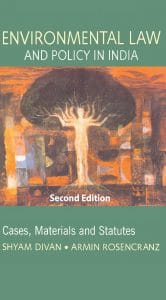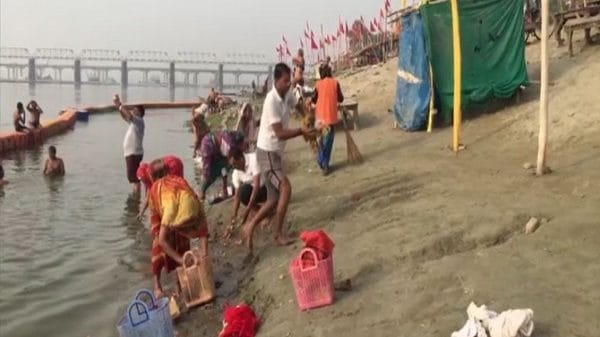Environmental resources often do not fit within man- made borders. They spill across the borders of nations. The sharing and common use of these resources constitute transboundary environmental issues. Simply put, these are issues relating to the international management of environmental resources and its impact. In this chapter, we consider transboundary water and air pollution from the Indian perspective.
Consider the Ganges River and its role in the relations between India and Bangladesh. The river passes through several states of India before flowing into Bangladesh, playing a major role in sustaining the Bangladeshi agricultural system. What would happen to Bangladesh’s largely agriculture- fuelled economy if India were to construct a dam on the Ganges? Obviously, the flow of water to Bangladesh would diminish, negatively affecting its crop yields, in turn harming its economy. The Farakka Barrage to the north of Kolkata already diverts a substantial amount of the Ganges River water that would otherwise flow into Bangladesh.
Further east, the Brahmaputra or the Yarlung Tsangpo, as it is referred to in Tibet, is one of the widest rivers in the world. It enters India after originating in China and finally meets the Bay of Bengal after passing through Bangladesh. The river accounts for 44% of India’s hydropower potential. The Chinese plans for dams and other diversion projects have been another point of tension between the two sparring nations. A similar issue arises between India, China and Pakistan with the Indus River and its tributaries.
Often these resources are vital to the cultures, societies and economies of many nations. For example, the Ganges is of tremendous religious significance in both India and Bangladesh, in addition to its economic and agricultural importance. Thus, the issue fails to remain simply environmental. Religious, political and social overtones further complicate matters.
Transboundary air pollution in the Indian context is minimal. The Himalayas block much of the pollution moving across India and China. With sea on three sides, the only air movement worth noting is across India and Pakistan. Stubble burning, as will be discussed later, is the primary cause of transboundary air pollution.
Also read: Quit stalling & pay up — what’s climate finance and why rich countries must step up urgently
Placing transboundary environmental issues in context
The transboundary implications of domestic decisions regarding environmental resources can be quite significant. Scarce environmental resources are already a major source of domestic and international conflict, and all evidence indicates that this will only increase. A prominent example is that of the Israel water wars— repeated and costly conflicts between Israel and its Arab neighbours over shared water resources.
Transboundary environmental issues must be studied in the context of their ability to ignite conflict and their potential for resolving tension. Particularly in the context of South Asia, which is already a region rife with political and historical tension, transboundary environmental issues can spark conflict. In the sharing of freshwater resources, such as those of the Indus, Ganges and Brahmaputra rivers, these river- sharing agreements could serve as confidence- building measures, facilitating negotiation, progress and resolution of other contentious issues.
This does not mean, however, that cooperation in the use of shared environmental resources should be viewed solely as a means of preventing and mitigating conflict. Such cooperation and agreement have the added advantage of responding to issues of degradation and depletion of environmental resources. In other words, the study of transboundary environmental issues is not just an exercise in preventing countries from fighting over environmental resources, but also in helping them to better use and preserve shared resources.
Also read: Sheikh Hasina’s Teesta water calls turn desperate. But Modi is weighing national interest
The law on transboundary environmental issues
The law on transboundary international issues is well established. Its basic contours were laid out in the Trail Smelter arbitration discussed in what follows. As Oppenheim stated in 1905, it is now accepted customary international law that a state is not allowed to alter the use of its territory in a manner that disadvantages the territory of the neighbouring state. This custom stems from the principle that all states are equal in international law, an idea also codified under the United Nations Charter.
Widespread state practice supports this obligation for states to treat other states equally and thereby not use their natural resources in a manner that would adversely impact the other state. Judicial decisions too back this claim. Two decisions worth noting are the Trail Smelter case7 and the Corfu Channel case.
The Trail Smelter case was a dispute between the United States and Canada in the 1920s and 1930s. It is also known for being one of the foremost international arbitrations under environmental law. In this case, smoke and dust from a smelter in the town of Trail, British Columbia (Canada) crossed the border into the United States and affected the forests and farms in Washington State. An arbitration ensued which led to the foundation of the ‘harm principle’. The principle suggests that no country should use its territory in a manner that causes environmental harm to another country.
The corollary of this principle is that the polluting country should pay damages to the harmed country. This principle, referred to as the ‘polluter pays principle’, is also extended domestically to compensate victims of environmental pollution. This decision supports the claim that any divergence or blockage of river flow to the detriment of a state’s riparian neighbours is a harm caused to their crops, forests and soil, and therefore prohibited under international law.
The second decision worth noting is the Corfu Channel case. This was a decision by the International Court of Justice (ICJ) and does not directly relate to environmental pollution, but the principle is relevant. The dispute was between the United Kingdom and Albania. During the Greek Civil War, tensions between Albania and the United Kingdom were high. A Royal Navy flotilla entered the Corfu Channel that divides Albania and Greece and was hit by sea mines. The United Kingdom blamed Albania for installing sea mines without warning, a violation of international law. Albania denied having installed any mines and blamed it on Greece. The United Kingdom sued Albania in the ICJ. The court admitted that it could not be conclusively proven that Albania installed the mines. However, in deciding in favour of the United Kingdom, the court held that the mines were located in Albanian territory and thus it should be held responsible as it used its territory in a manner that caused injury to the United Kingdom. In a similar context, the use of territorial sovereignty of a state as a justification for diverting substantial portions of a river to the detriment of the riparian neighbour is not permissible under international law as it causes harm to that neighbour.
 This excerpt from ‘Environmental Law & Policy in India’ by Shyam Divan and Armin Rosencranz has been published with permission form Oxford University Press.
This excerpt from ‘Environmental Law & Policy in India’ by Shyam Divan and Armin Rosencranz has been published with permission form Oxford University Press.






